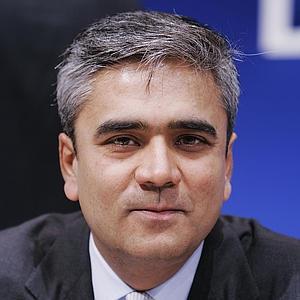
Speculation is growing that India-born Anshu Jain may take over as the co-head of Deutsche Bank, Germany's largest private bank, together with Bundesbank President Axel Weber, when the incumbent Josef Ackermann retires in early 2013.
Media reports said Weber's resignation from the leadership of the German central bank is imminent and he has already informed his management board colleagues about his intention not to seek a second term when his current term expires in April next year.
He has also conveyed to the German Government that he will not be available for any other public office as he has decided for another career, according to the reports.
Until now, 53-year-old Weber was widely seen as the most promising candidate to succeed Jean-Claude Trichet, the President of the European Central Bank, who retires at the end of October.
Weber was favoured by German Chancellor Angela Merkel to become the next ECP president and his decision not to seek any other public office has reopened the race for the leadership of the central bank for Europe's single currency, the euro.
The ECB's main task is to maintain the euro's purchasing power and thereby price stability in the 17-nation euro area.
The reports said Weber has made up his mind to swap his present job for a career with Deutsche Bank, where he is tipped to share the post of management board chairman together with Jain, who in July last year took over as the head of the bank's investment banking division.
Jain also manages Deutsche Bank's global markets division. Jain, who earned international repute as a successful investment banker, has been credited with building up Deutsche Bank's investment banking as a profitable business even during the financial crisis, when global investment banking suffered a decline.
Investment banks were blamed by governments and politicians for contributing to the crisis through their business practices.
Jain, 47, has the best credentials to succeed Ackermann, but Deutsche Bank's supervisory board members are not prepared to hand over the running of the entire bank to an investment banker, said the reports.
Weber's experience at the helm of the Bundesbank and his close relationship with the federal government will be an asset for Deutsche Bank, but he lacks experience in investment banking.
Therefore, the board is in favour of both Jain and Weber being roped in to replace Ackermann, the reports said.
Weber will look after the bank's German business and nurture the necessary contacts with Berlin.
Deutsche Bank has not made any comments about these reports.
Under Germany's banking laws, Weber is not supposed to move to Deutsche Bank immediately after stepping down from the Bundesbank, as he knows sensitive information about Deutsche Bank's competitors.
When he can take up his new job has to be worked out by Deutsche Bank, the reports said.
Two front-runners to succeed Weber as the Bundesbank President are Jens Weidmann, Chancellor Merkel's advisor on economic policy matters, and Juergen Stark, chief economist of the ECB.
Weidmann is already set to join the Bundesbank board at the end of this year to replace vice-president Franz-Christoph Zeitler, who retires.
When Weber leaves the race for the ECB presidency, the main contenders left in the field are Italian Central Bank governor Mario Draghi, Portugal's Vitor Constancio, who last year became the vice-president of the ECB, and Luxembourg's Central Bank Governor Yven Mensch.
Germany is very unlikely to field another candidate to replace Weber.
